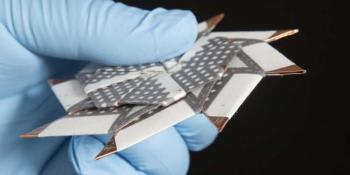A Binghamton University researcher's new disposable battery folds like an origami ninja star. The microbial fuel cell could power biosensors and other small devices in challenging field conditions.

Engineer Seokheun “Sean” Choi's new design folds into a star with one inlet at its center and the electrical contacts at the points of each side. After a few drops of dirty water are placed into the inlet, the device can be opened into a Frisbee-like ring to allow each of the eight fuel cells to work.
Each module is a sandwich of five functional layers with its own anode, proton exchange membrane, and air-cathode. The device uses filter paper, carbon cloth (for the anode), and copper tape. The team’s next goal is to produce a fully paper-based device that has the power density of the new design and a lower price tag.
The current device, about 2.5-inches wide, costs about 70 cents to make. According to Choi, the device could support the use of more sophisticated fluorescent or electrochemical biosensors in developing countries.
Also: Learn about NASA's Origami-Inspired Folding of Thick, Rigid Panels.

